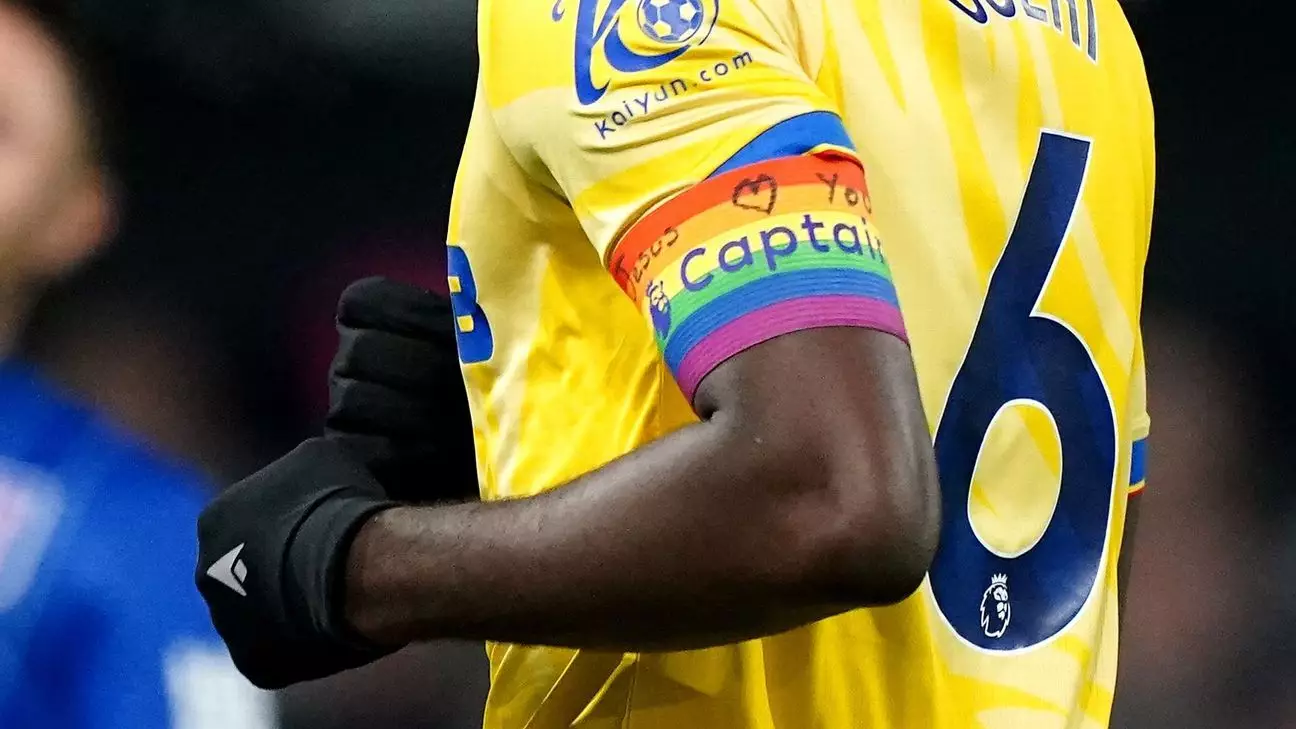In the dynamic landscape of sports, where personal beliefs often intersect with institutional regulations, few recent events encapsulate this tension better than the actions of Crystal Palace defender Marc Guéhi. During a match against Ipswich Town, Guéhi, proudly donned in a rainbow captain’s armband—a symbol of solidarity with the LGBTQ+ community—took the unusual step of writing “Jesus loves you” on the arm band. This act, which occurred following a previous game where he inscribed “I love Jesus,” has sparked both criticism and defense from various corners of the football world.
Despite the potential consequences outlined by the English Football Association (FA), Guéhi received only a reminder about kit regulations rather than formal censure. The FA’s Rule A4, which prohibits religious messages on clothing, quickly came to the forefront of this discussion, raising important questions about the boundaries between personal beliefs and professional conduct in sports.
To contextualize the implications of Guéhi’s actions, it’s vital to understand the regulations governing football kits. The FA updated its Laws of the Game last summer to ensure that all captains wear armbands devoid of personal slogans or religious imagery. This move aimed at maintaining a neutral image during matches, especially as football increasingly endeavors to promote inclusivity. By providing rainbow-coloured armbands branded with Stonewall’s Rainbow Laces campaign, the Premier League affirmed its commitment to LGBTQ+ rights.
However, Guéhi’s writings on the armband introduce a complex interplay between the FA’s directives and individual expression, raising pivotal questions. Can a player uphold their faith while simultaneously promoting a cause? Where does one draw the line between personal expression and adherence to sporting regulations?
The reactions to Guéhi’s actions have been diverse yet revealing. Crystal Palace manager Oliver Glasner acknowledged Guéhi’s right to express his beliefs, emphasizing respect for individual opinions within a contemporary framework of inclusivity and integration. “Marc as well,” Glasner stated, validating the player’s autonomy in a world striving for acceptance of diverse perspectives.
On the opposing side, Ipswich mid-fielder Sam Morsy’s refusal to wear the rainbow armband further highlights the nuanced reactions within the community. Identifying as a practicing Muslim, Morsy opted for a regular black armband, a decision the FA deemed a personal matter. This incident reveals a spectrum of beliefs within a single sport and underscores the intricate realities athletes navigate in expressing their authenticity while participating in collective values.
The Broader Implications for Inclusivity in Sports
This incident brings to light the broader implications for inclusivity in professional sports. Stonewall, a prominent advocacy organization, lauded the support from various football teams for LGBTQ+ inclusion, expressing that such cooperation fosters a sense of safety and acceptance. Authentic representation and support for marginalized communities are vital, yet the challenge lies in reconciling deeply held personal beliefs with collective values.
Guéhi’s message, framed as “a message of love and truth,” starkly contrasts the armband’s purpose, which is to celebrate and promote LGBTQ+ issues. While his intent may have been rooted in inclusivity, the choice to convey a religious message on an LGBTQ+ symbol injects complexity into the discourse surrounding faith, identity, and sport—a microcosm of societal debates at large.
The incident involving Marc Guéhi is a compelling example of the ongoing discourse around faith and inclusivity within sports. It underscores an urgent need for dialogue that embraces differing beliefs while also maintaining a commitment to inclusivity and respect for all individuals. As sports organizations continue to promote inclusive policies, it is essential to engage in meaningful conversations that accommodate a diversity of voices while steering clear of conflict.
By fostering such discussions, the sports community can not only navigate these complexities but also cultivate a culture that respects and celebrates both inclusion and the diversity of beliefs. Whether on the pitch or off it, creating spaces where love, truth, and understanding can flourish is paramount for a harmonious sporting environment that truly respects everyone involved.

